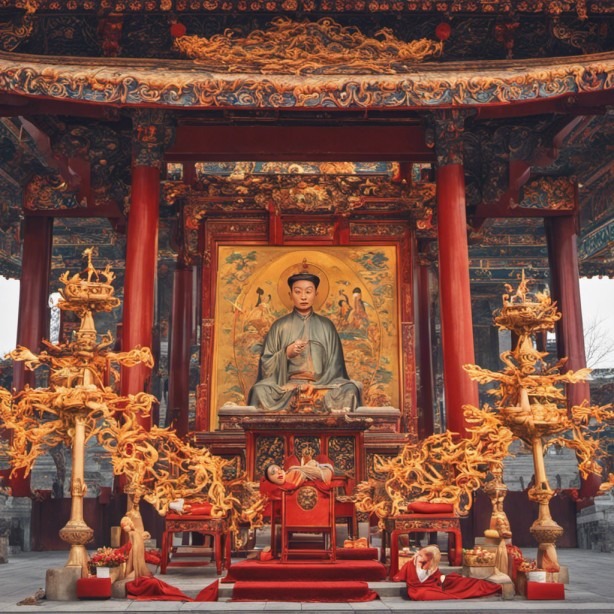
Navigating the Diversity of Religion in China
Sept 25, 2023
Introduction
Religion in China forms an intricate and ever-evolving tapestry intricately woven with historical, cultural, political, and even economic influence threads. While the Chinese government officially champions atheism, it extends recognition to five state-sanctioned religious organizations: Buddhism, Taoism, Islam, Protestantism, and Catholicism. Yet, amid this spiritual diversity, religious minorities and clandestine religious establishments grapple with persecution and stringent limitations on their practices. This narrative explores the religious dynamics within China, unveiling the formidable challenges that religious communities confront within an ever-shifting cultural and economic landscape.
Moreover, it is worth considering that religious attitudes can notably impact the local economy. In some instances, individuals may channel their energies towards resistance rather than leveraging them to stimulate and enhance the economic prospects of their region.
Oppression of Religious Minorities
Religion in China has indeed witnessed the oppression of various religious minorities, with the Uyghur Muslims in the Xinjiang Uyghur Autonomous Region being among the most affected. The Uyghurs have faced severe human rights abuses, including arbitrary detention in internment camps, forced labour, and the suppression of their religious practices. These actions by the Chinese government have drawn international criticism and raised concerns about violating fundamental human rights and religious freedoms.
The treatment of Uyghur Muslims has been a global concern, with several countries, including the United States, label it genocide. The Chinese government’s policies in Xinjiang have been characterized by strict surveillance, restrictions on religious practices, and efforts to assimilate the Uyghur population into the dominant Han Chinese culture. These measures have resulted in a significant erosion of religious freedom and cultural identity for the Uyghur community.
The internment camps, euphemistically referred to as “re-education centres,” were a focal point of the oppression faced by the Uyghurs. Reports from survivors and human rights organizations have detailed instances of physical and psychological abuse, forced indoctrination, and the denial of fundamental rights within these camps. The Chinese government has defended these measures as necessary for combating extremism and maintaining social stability, but the international community remains deeply concerned about the human rights implications.
The oppression faced by religious minorities in China extends beyond the Uyghur Muslims. Other groups, such as Tibetan Buddhists, have also experienced restrictions on their spiritual practices and cultural expression. In Tibet, believers live under extensive surveillance, with limitations on travel and communication. Monks and practitioners are often detained on terrorism charges, and religious sites are subject to heavy state-controlled security. The Chinese government’s actions in Tibet have been criticized for undermining religious freedom and cultural preservation.
The international community has called for greater transparency and accountability from the Chinese government regarding its treatment of religious minorities. Human rights organizations, activists, and governments have urged China to respect religious freedom, protect the rights of religious minorities, and address the allegations of human rights abuses. The ongoing oppression of religious minorities in China highlights the importance of promoting and defending religious freedom as a fundamental human right.
Targeting Buddhism and Taoism
Buddhism and Taoism, two prominent religions in China, have faced government scrutiny, particularly in Tibet. Believers in Tibet live under extensive surveillance, with restrictions imposed on their travel and communication. Monks and practitioners are often detained on terrorism charges, and religious sites are subject to heavy state-controlled security measures. The strained relationship between the Chinese government and Tibetan Buddhism is exemplified by the continued exile of the Dalai Lama, a revered figure in Tibetan Buddhism.
The Chinese government’s policies in Tibet have been a subject of international concern, with human rights organizations and governments calling for greater respect for religious freedom and cultural preservation. The restrictions imposed on Tibetan Buddhism have raised questions about the government’s commitment to upholding the rights of religious minorities and allowing for the free practice of religion.
The Dalai Lama’s exile symbolises the complex relationship between the Chinese government and Tibetan Buddhism. The Dalai Lama, who is seen as the spiritual leader of Tibetan Buddhism, has been living in exile since 1959. Despite his efforts to promote peace, compassion, and dialogue, the Chinese government has accused him of separatist activities and continues to view him as a threat to national security.
The restrictions on Buddhism and Taoism in Tibet reflect the Chinese government’s desire to maintain regional control and stability. However, these measures have been criticized for undermining religious freedom and cultural autonomy. The international community has called for a more inclusive approach that respects the rights and traditions of Tibetan Buddhists.
It is important to note that while the Chinese government’s policies have significantly impacted religious practices in Tibet, Buddhism and Taoism continue to be practised by millions across China. These religions hold deep historical and cultural significance and have played a vital role in shaping Chinese society.
Christianity Under Attack
Christianity in China has indeed faced increasing pressure from the government, leading to a challenging environment for Catholics and Protestants. The Chinese government has ordered believers to renounce their faith, resulting in the destruction of crosses, Bibles, and churches. Pastors and church attendees have been arrested, and churches have been subjected to high-tech surveillance measures, including facial-recognition cameras.
The government’s efforts to “Sinicize” Christianity reflect its desire to align religious practices with Chinese culture and the objectives of the Chinese Communist Party. As part of this process, the Chinese government has retranslated the Bible to establish a “correct understanding” of the text in line with Chinese cultural values. These measures aim to exert greater control over religious practices and ensure they align with the party’s interests.
The crackdown on Christianity in China has drawn international attention and criticism. Human rights organizations and governments have expressed concerns about violating religious freedom and suppressing religious communities. The restrictions imposed on Christians have led to a challenging environment for believers, who must navigate the delicate balance between their faith and the potential consequences of government scrutiny.
Despite the challenges, Christianity continues to grow in China, with many believers practising their faith in underground churches or house churches. These underground communities provide a space for religious expression outside the purview of state-sanctioned organizations. However, practitioners face the constant risk of government crackdowns and surveillance.
The future of Christianity in China remains uncertain. While the government’s efforts to control and suppress the religion pose significant challenges, the resilience and determination of believers cannot be underestimated. The international community continues to advocate for religious freedom and the protection of the rights of Christians in China.
The Changing Landscape of Religious Suppression
The intensified repression of religion in China can indeed be attributed to a policy shift initiated by President Xi Jinping in 2016. The government’s push for Sinicization aims to align faiths more closely with the objectives and values of the Chinese Communist Party. This shift has affected all organized religions in China, but Christian and Muslim communities have particularly felt the impact of the government’s actions.
The Sinicization process seeks to exert greater control over religious practices and ensure they align with the party’s interests. This has resulted in increased government scrutiny, restrictions, and surveillance of religious activities. The government aims to shape religious beliefs and practices to conform to Chinese culture and the party’s ideology.
Christianity and Islam have faced significant challenges due to this policy shift. Both communities have experienced increased pressure to conform to state-sanctioned versions of their faith, with the government imposing regulations on religious practices, retranslating religious texts, and implementing surveillance measures. These actions aim to exert control over religious institutions and limit their influence.
The changing landscape of religious suppression in China has raised concerns among human rights organizations and the international community. The restrictions on religious freedom and the government’s efforts to control and shape spiritual practices have been criticized for violating fundamental human rights and undermining the autonomy of religious communities.
Notably, the policy shift towards Sinicization does not mean the complete eradication of religion in China. Religious communities continue to adapt and find ways to practice their faith within the confines of government regulations. Underground religious establishments and house churches have emerged as alternative spaces for believers to gather and worship.
The future of religious expression in China remains uncertain. While the government’s efforts to suppress and control religion have intensified, religious communities have shown resilience and determination in preserving their faith. The international community plays a crucial role in advocating for religious freedom and urging the Chinese government to respect the rights of religious minorities.
Navigating Religious Expression
Despite the challenges faced by religious communities in China, many individuals continue to practice their faith in underground establishments, such as Christian house churches. These underground communities provide a space for religious expression outside the purview of state-sanctioned organizations. However, practitioners must navigate a delicate balance between their religious beliefs and the potential consequences of government scrutiny.
The existence of underground religious establishments reflects the resilience and determination of believers to maintain their faith despite the restrictions imposed by the government. These communities often operate discreetly, holding gatherings in private homes or other inconspicuous locations. By doing so, they create a space to freely express their religious beliefs and worship without interference from state authorities.
However, practitioners of underground religious establishments must be cautious and aware of the potential risks involved. The Chinese government has been known to crack down on such gatherings, leading to arrests, interrogations, and confiscation of religious materials. The delicate balance between practising one’s faith and avoiding government scrutiny requires individuals to exercise caution and discretion in their religious activities.
Despite the challenges and risks, underground religious communities continue to thrive and provide believers with spiritual support and community. These communities often foster strong solidarity and mutual support, allowing individuals to connect with like-minded believers and share their faith experiences.
Underground religious establishments also highlight the importance of religious freedom and the right to practice one’s faith without fear of persecution. Human rights organizations and the international community have called for tremendous respect for religious freedom in China and have urged the government to protect the rights of religious minorities.
The Future of Religion in China
The future of religion in China is indeed uncertain as religious communities continue to navigate the complexities of state control and seek to preserve their beliefs and traditions. While the government’s repression of religious minorities persists, there are signs of resilience and adaptation within these communities.
Some scholars argue that spiritual practices in China are evolving and finding new forms of expression that align with the country’s changing social and political landscape. Religious communities are exploring alternative avenues to practice their faith, such as underground establishments and online platforms, which provide spaces for religious expression outside the purview of state-sanctioned organizations.
Moreover, there is a growing interest among younger generations in exploring spirituality and seeking meaning beyond material pursuits. This shift in attitudes and values may contribute to the evolution of religious practices in China as individuals seek to reconcile their spiritual beliefs with the demands of modern life.
However, it is essential to note that the Chinese government’s control over religious activities and its efforts to shape spiritual practices according to its interests pose significant challenges to the future of religion in China. The government’s policies and regulations continue to restrict religious freedom and limit the autonomy of religious communities.
The international community plays a crucial role in advocating for religious freedom and supporting the rights of religious minorities in China. By raising awareness, engaging in dialogue, and urging the Chinese government to respect the rights of individuals to practice their faith freely, there is hope for a more inclusive and tolerant future for religion in China.
Conclusion
In conclusion, the intricate tapestry of religion in China is marked by complexity and diversity. It is influenced by historical, cultural, and political factors, with various challenges facing religious communities, especially minorities and underground establishments. The oppression endured by groups like the Uyghur Muslims and government efforts to exert control and Sinicize religions reflects the ever-evolving dynamics of religion in China.
Nevertheless, amidst these challenges, religious communities in China have displayed remarkable resilience and adaptability, finding innovative ways to uphold their faith. The future of religion in China remains uncertain, shaped by ongoing struggles for religious freedom and the preservation of cultural and religious traditions. The unwavering support and advocacy for religious freedom from the international community play an indispensable role in championing the rights of religious minorities and fostering a more inclusive and tolerant society.
It is imperative to remain vigilant and informed about the developments in China’s religious landscape as it continues to evolve in response to the complex interplay of forces and dynamics.
Articles That Nourish the Intellect and the Soul

How to know when to invest in a stock?

🏆 Gold Price Trends: Climbing Higher or Crashing Hard?

💰 The Good and The Ugly of Trading Futures: Play Smart or Pay Up

💰 Saving for Retirement: Invest Smart, Retire Rich

⚡ A Cataclysmic Warning: Jim Rickards track record Accurate as They Say?

Is Work Slavery? Yes—Here’s How to Escape the Rat Race 🚀

What are some metacognition examples in daily life?

🌀 Analysis Paralysis: When Overthinking Turns You Into a Stubborn Burro

How to overcome fear of trading?

What is an example of the decoy effect?

🐶 The Dogs of the Dow 2024: Simple Yet Highly Effective 🚀
Transform Your Mindset with Sayings by Sol Palha

BRICs currency news

What is decoy effect in marketing?



